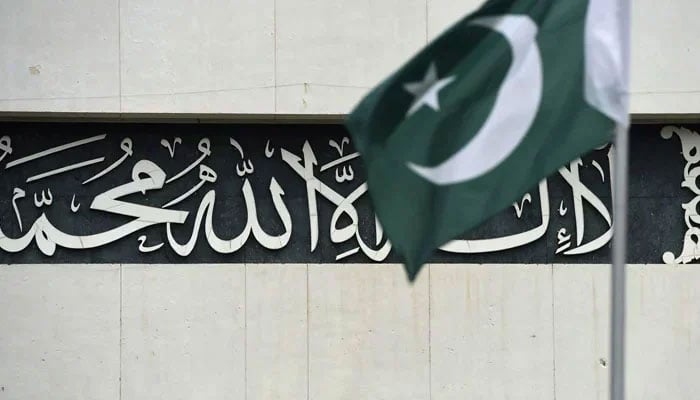To safeguard GSP Plus status: Pakistan steps up hazardous waste, chemical safety action
It focused on aligning Pakistan’s practices with the Basel, Rotterdam, Stockholm, and Minamata Conventions
LAHORE: Pakistan is intensifying efforts to strengthen chemical safety and hazardous waste management as part of its strategy to safeguard preferential trade access to European markets under the Generalised Scheme of Preferences Plus (GSP Plus), officials said on Friday.
A national training workshop, jointly organised by the Ministry of Climate Change and Environmental Coordination (MoCC&EC) and the United Nations Environment Programme (UNEP), brought together senior government officials, provincial regulators, industry leaders, and environmental experts to chart a path towards compliance with key multilateral environmental agreements.
It focused on aligning Pakistan’s practices with the Basel, Rotterdam, Stockholm, and Minamata Conventions.
A significant portion of the training was dedicated to building capacity on the GHS framework, which promotes safer handling and use of chemicals in industrial processes through improved classification and labelling.
Pakistan’s export-driven economy relies heavily on preferential access to European Union markets.
However, its GSP Plus status is contingent upon compliance with 27 international conventions, including those governing hazardous waste and chemical management.
Any shortcomings in meeting these commitments risk undermining both environmental safeguards and critical trade benefits.
Participants reviewed the National Hazardous Waste Management Policy (2022), the Globally Harmonized System (GHS) for chemical classification and labelling, and enforcement mechanisms under provincial environmental frameworks.
Industry representatives explored practical approaches to waste minimisation, adoption of safer alternatives, and the phasing out of hazardous substances.
“This workshop represents a turning point in Pakistan’s efforts to modernise its chemical management practices,” said Ms Nazia Zaib Ali, Joint Secretary (International Cooperation) at MoCC&EC. In a key development, Zakya Rubab, National Project Coordinator at MoCC, announced the upcoming launch of Pakistan’s first online portal for obtaining No Objection Certificates for the import of chemicals under the Basel Convention.
-
 HBO Mulls Major 'Game Of Thrones' Spin-off Focusing On A Stark
HBO Mulls Major 'Game Of Thrones' Spin-off Focusing On A Stark -
 Ashton Kutcher Says He's Proud Of Demi Moore
Ashton Kutcher Says He's Proud Of Demi Moore -
 Why Prince William, Kate Hired A Crisis Expert Despite Royal 'calm'?
Why Prince William, Kate Hired A Crisis Expert Despite Royal 'calm'? -
 Extent Of Meghan Markle’s Fears Gets The Spotlight: ‘The Press Detest Her Which Is A Problem’
Extent Of Meghan Markle’s Fears Gets The Spotlight: ‘The Press Detest Her Which Is A Problem’ -
 Caitlyn Jenner Finally Reacts To Kylie, Timothee Chalamet Relationship
Caitlyn Jenner Finally Reacts To Kylie, Timothee Chalamet Relationship -
 Prince William’s Beefed Up PR All Set To Fight Off ‘plot’ And ‘it Might Not Be Long’
Prince William’s Beefed Up PR All Set To Fight Off ‘plot’ And ‘it Might Not Be Long’ -
 Kate Middleton Ups A New Role Unofficially For King Charles As William Prepares His Coronation
Kate Middleton Ups A New Role Unofficially For King Charles As William Prepares His Coronation -
 Teyana Taylor Says She Misread Leonardo DiCaprio Globes Moment
Teyana Taylor Says She Misread Leonardo DiCaprio Globes Moment -
 A$AP Rocky Reveals What Encouraged Him To Date Rihanna
A$AP Rocky Reveals What Encouraged Him To Date Rihanna -
 Newborns At Risk: Health Experts Warn Your Baby Could Already Have Diabetes
Newborns At Risk: Health Experts Warn Your Baby Could Already Have Diabetes -
 Sarah Ferguson Updates Her Plans Now That Andrew’s Eviction Is Nine Days Away
Sarah Ferguson Updates Her Plans Now That Andrew’s Eviction Is Nine Days Away -
 Hailey Bieber Sends Cease And Desist To TikToker
Hailey Bieber Sends Cease And Desist To TikToker -
 Kate Middleton Celebrates England Women's Rugby Stars After World Cup Win
Kate Middleton Celebrates England Women's Rugby Stars After World Cup Win -
 Kris Jenner Dubs Chicago West Her 'sweet Angel' As She Turns Eight
Kris Jenner Dubs Chicago West Her 'sweet Angel' As She Turns Eight -
 Josh Charles Credits Taylor Swift For His, Ethan Hawke’s Moon Person Trophies
Josh Charles Credits Taylor Swift For His, Ethan Hawke’s Moon Person Trophies -
 Jodie Foster Voices Opinion About 'misogyny'
Jodie Foster Voices Opinion About 'misogyny'




